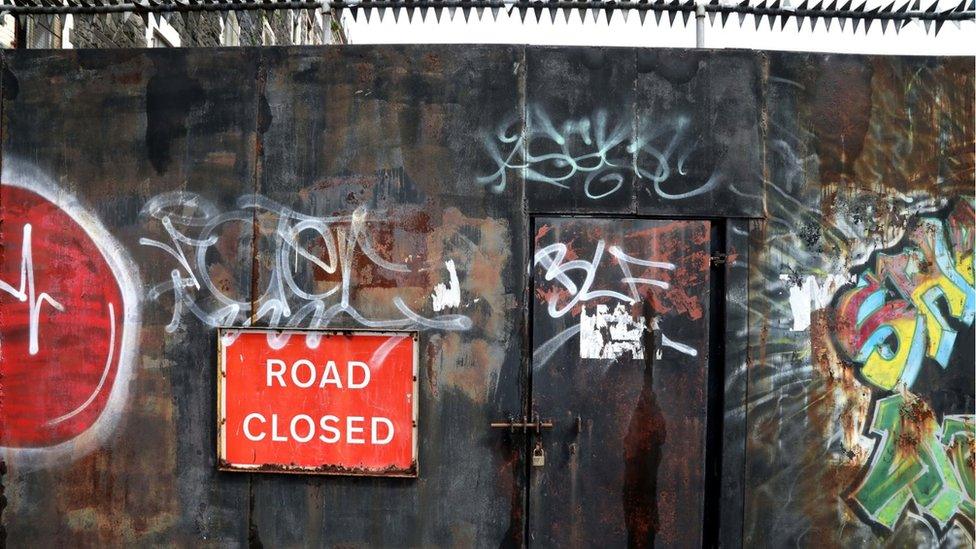Battle of Belfast: Elections in place of contrasting narratives
- Published
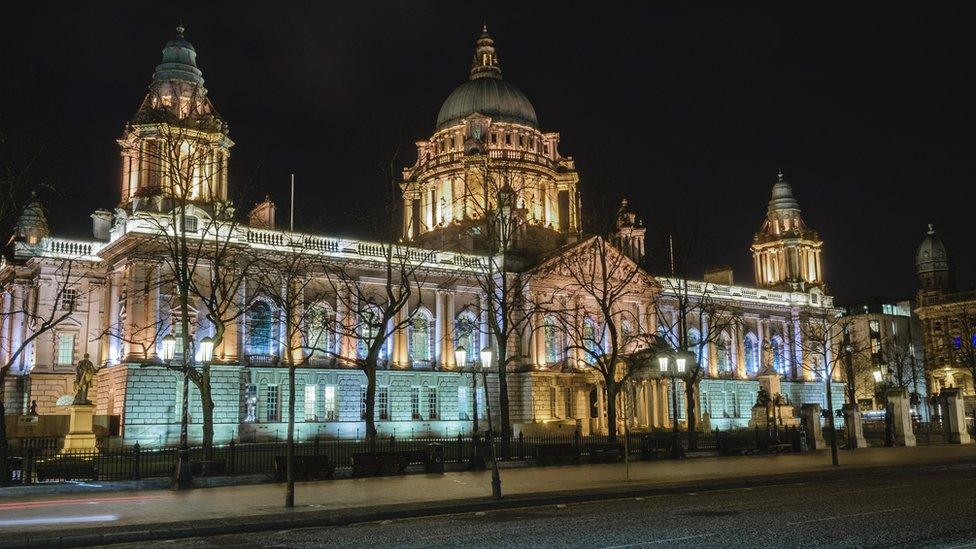
In many ways, Belfast is a place of contrasting narratives.
One story focuses on Stormont's paralysed politics, communities still divided, and the unresolved legacy of the Troubles.
Another highlights the remarkable changes over the last quarter century - the peace process, a transformed cityscape, and a huge increase in international visitors.
The general election campaign is playing out amidst this tension between the past, the present and the future - and Northern Ireland's capital is its key battleground.
One of the features which sets Belfast apart is symbolic of the challenges born many years ago which are still strongly felt today.
'Comfort blanket'
Some areas of the city are criss-crossed by "peace walls" - physical barriers which separate unionist and nationalist communities.
Sarah Lorimer is co-ordinator of the Imagine Peace Walls Project, which works with people in the Cliftonville and Lower Oldpark districts, in the north of the city, and aims to help remove the structures in the long-term.
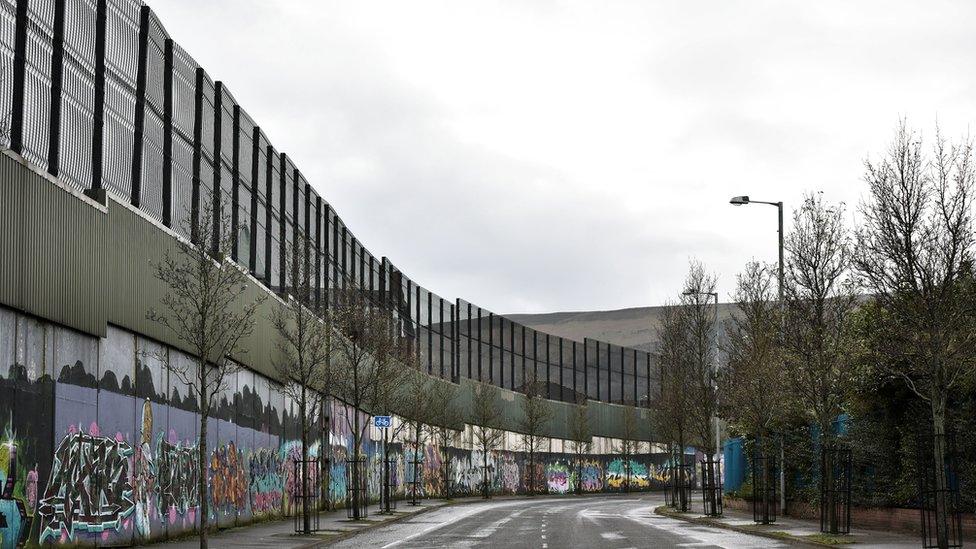
A peace wall that divides communities in Belfast
She showed me one of the barriers - a turquoise wall, about 25ft tall (7.6m), and about 10ft behind a fence of similar height, standing between two residential areas.
"Some people see the walls as a comfort blanket, which allows them to feel safe and secure in their homes," Ms Lorimer says.
"Others see them as a relic of the past."
She explains that although there haven't been sectarian attacks for a long time, some people have a sense of a "perceived threat" which comes from "a lived experience of a volatile interface".
Ms Lorimer stresses that segregation is an issue for wider society: "93% of social housing is segregated, our education system is more than 90% segregated."
"Peace walls are a manifestation of all that, and we see their removal as a process which may take another generation."
A recent survey by the International Fund for Ireland - which supports Ms Lorimer's work and many other peace and reconciliation programmes - found that contact between the communities living near peace walls was gradually increasing.
Some 76% of people were strongly in favour of barriers being removed within the lifetime of their children or grandchildren - compared to 68% two years ago.
Ms Lorimer highlights that of almost 100 peace walls in the city, most are in the North Belfast constituency.
It is here that one of the most intense election races is being run.
The Democratic Unionist Party's (DUP) Westminster leader Nigel Dodds is being challenged by Sinn Féin's John Finucane, who is currently Lord Mayor of Belfast.
The Ulster Unionist Party (UUP) has pulled out of the contest, while the DUP has done the same in the westerly constituency of Fermanagh and South Tyrone, to support the UUP.
The unionist parties had the same arrangement in 2017, but what is different this time around is that the nationalist SDLP has decided not to run in North Belfast.
The SDLP and Sinn Féin say they want to maximise the anti-Brexit vote.
So in South Belfast - which is also currently held by the DUP - Sinn Féin has stood aside, in a move which has been seen as mainly lifting the chances of the SDLP.
The parties are characterising the move as a pro-Remain tactic.
They have also stood aside in east Belfast, and the anti-Brexit Green Party has decided against running anywhere in the city.
The cross-community Alliance Party - which opposes Brexit - has chosen to run in every constituency in Northern Ireland, after making significant gains in the council and European elections earlier this year.
Brexit has added a new dimension to the already complex electoral dynamics in this part of the UK.
'Fulcrum of the election'
David McCann, from the political blogsite Slugger O'Toole, says that for years, it was always "just the unionist parties who came together at election time".
"But now the nationalist parties have come around to it as well," he says.
"It's the idea of remaining in the European Union which has made it palatable after all this time."
He explains why Belfast is the fulcrum of the election in Northern Ireland.
"The SDLP's top target is South Belfast; Sinn Féin's top target is North Belfast; and the Alliance Party's top target is East Belfast.
"Of course, the DUP is trying to protect all three."
Brexit has generated new debate about the constitutional future of Northern Ireland.
The DUP campaigned for Brexit, but strongly opposes the withdrawal agreement Boris Johnson has secured with the EU, because it argues it drives an economic wedge between Northern Ireland and the rest of the UK.
Of the four Belfast constituencies, only East Belfast recorded a majority for leave in the 2016 referendum.
Across the city, there was an overall remain vote of 60%.
Recent election results have also made constitutional issues more prominent, including the 2017 Stormont Assembly poll, when unionism lost its overall majority in the chamber for the first time.
'Most toxic'
The unionist writer and commentator Alex Kane says unionism and nationalism are engaged in a "psychological electoral war of attrition".
"With unionism no longer having a majority in the assembly, or in Belfast City Council, they could point to the Westminster seats as a success," says Mr Kane.
"To lose even one of those will do damage."
He warns that the tone of political discourse is changing for the worst.
In fact, he thinks that of all the elections he's ever observed, this one is the "most toxic".
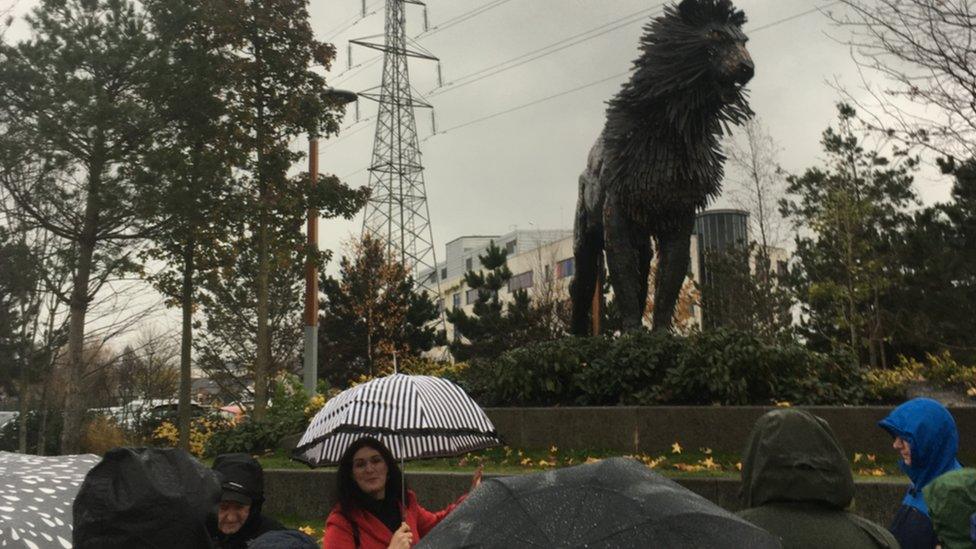
Lolly Spence on her C S Lewis tour
If you move from the campaign trail to the tourist trail, there's a very different mood.
The focus of recent days has been fantasy battles rather than political combat.
The annual C S Lewis festival, celebrating the life of one of the most famous writers to come from Belfast, is one of the events aimed at promoting Northern Ireland's image.
Lolly Spence hosts a walking tour around sights associated with the creator of Narnia.
"For 30 years, any time we were in the headlines, it was something negative," she says.
"It's so important we tell a positive story. This sort of heritage is very inclusive, it embraces everybody."
These are pivotal times in Belfast - the next few weeks particularly so.
- Published23 November 2016
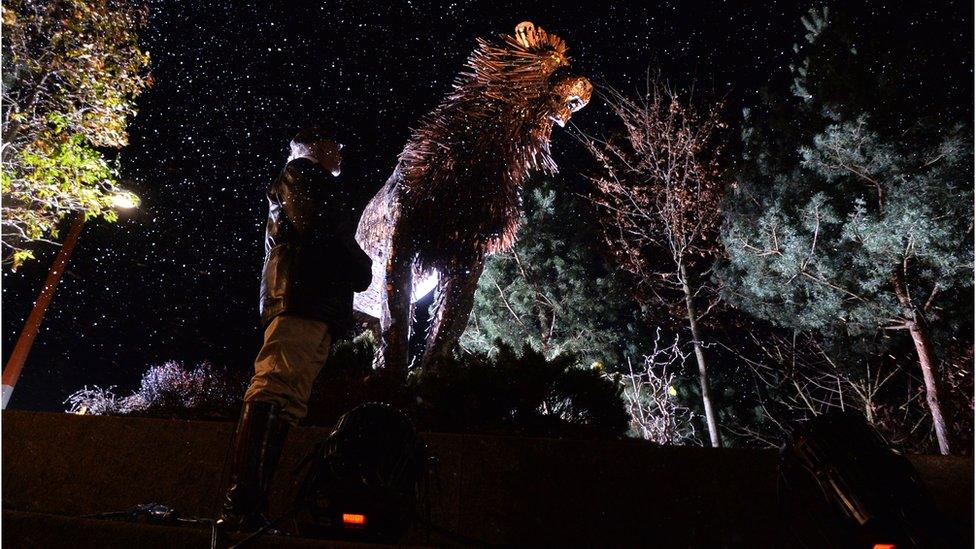
- Published12 November 2019
